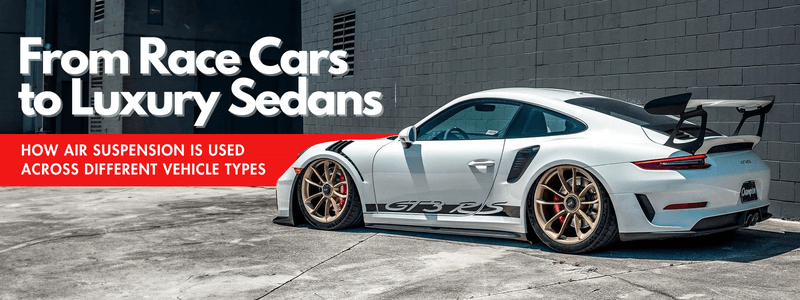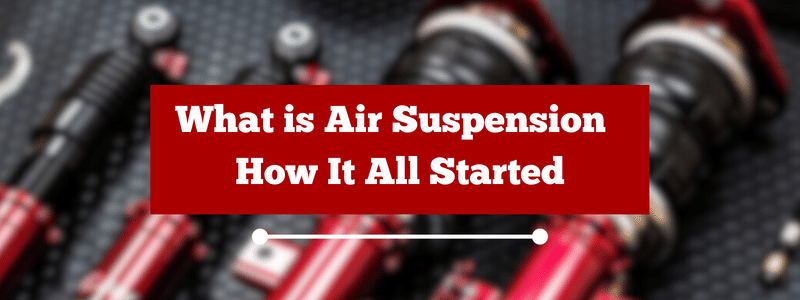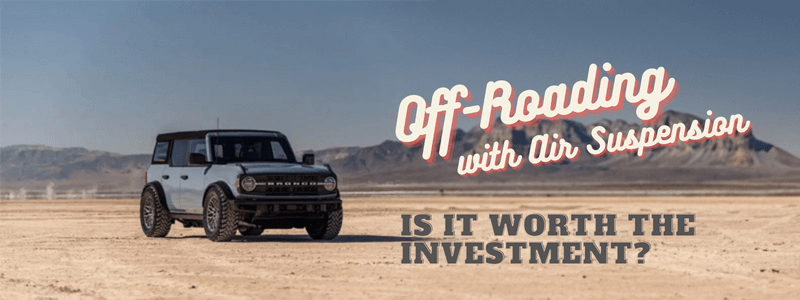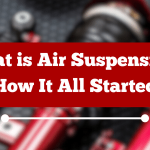
Air suspension is revolutionizing the way we drive, and it’s no surprise that more and more cars are making the switch. With its superior comfort, improved handling, and enhanced safety features, air suspension has quickly become a must-have for serious drivers everywhere. In this blog post, we’ll explore the benefits of air suspension in detail and why you should consider upgrading your vehicle today!
What is Air Suspension?
Air suspension is a type of vehicle suspension that uses airbags instead of traditional springs. Air suspension can provide a smoother ride over bumps and uneven surfaces, and can also be adjusted to provide a custom ride height. Many luxury vehicles and some sports cars are equipped with air suspension, and it is becoming more common in mainstream vehicles as well.
Benefits of Air Suspension
Air suspension has a number of benefits that are making it increasingly popular in the automotive world. Perhaps the most notable benefit is the fact that air suspension can provide a much smoother ride than traditional spring-based suspensions. This is because air suspension can better absorb bumps and other imperfections in the road.
In addition to providing a smoother ride, air suspension can also improve handling and performance. This is due to the fact that air suspension can be adjusted to be firmer or softer, depending on the needs of the driver. This allows for a more customized driving experience, which can be beneficial for both everyday driving and more aggressive driving styles.
Finally, air suspension can also help to improve fuel economy. This is because air suspension often weighs less than traditional spring-based suspensions. This means that there is less weight for the engine to move, which can lead to better fuel efficiency.
How Does an Air Suspension System Work?
An air suspension system is a type of vehicle suspension that uses compressed air instead of conventional springs. Air suspension systems have been used in vehicles for many years, but they have become more common in recent years as advances in technology have made them more reliable and affordable.
Air suspension systems work by using a compressor to pump air into a chamber (or bags) located at each corner of the vehicle. The air pressure in the chamber provides support for the vehicle, and can be adjusted to provide a comfortable ride or a firmer, sportier feel.
One of the main benefits of air suspension is that it provides a smoother ride than traditional spring-based suspensions. This is because air chambers are able to absorb small bumps and imperfections in the road surface much better than springs. Additionally, air suspension systems can be adjusted to provide different levels of support and comfort, depending on the needs of the driver.
Another benefit of air suspensions is that they can improve fuel economy by reducing aerodynamic drag. When a vehicle is lowered closer to the ground, it has less surface area exposed to wind resistance. This can lead to significant savings on fuel costs, especially for larger vehicles like SUVs and trucks.
Finally, air suspensions can also improve handling by keeping the tires in contact with the road surface more consistently. This helps with traction and braking, and can make a car feel more stable and responsive on winding roads or during emergency maneuvers.
Types of Air Suspension Systems
There are two main types of air suspension systems: passive and active. Passive air suspension systems rely on the air pressure in the atmosphere to provide support for the vehicle. Active air suspension systems have an onboard compressor that pumps air into the system to provide support.
Both types of air suspension systems have their advantages and disadvantages. Passive systems are typically less expensive and require less maintenance than active systems. Active systems, on the other hand, can be adjusted to provide a more personalized ride and can be better at handling heavy loads.
Ultimately, the best type of air suspension system for a particular vehicle depends on its intended use and the preferences of the owner.
Pros and Cons of an Air Suspension System
An air suspension system is a type of automobile suspension system that uses air springs instead of traditional steel springs. Air suspension systems have several advantages over conventional suspension systems, including a smoother ride, improved handling, and better load-carrying capacity. However, air suspensions also have some disadvantages, such as increased complexity and cost.
What Cars Use Air Suspension?
The modern car is a marvel of engineering, and one of the most important aspects of a car’s design is its suspension. The suspension is what allows your car to handle bumps in the road and keep you comfortable while driving. There are many different types of suspension systems, but air suspension is becoming increasingly popular in today’s cars.
Air suspension is a type of vehicle suspension that uses air springs instead of traditional steel springs. These air springs are filled with compressed air, which gives them their name. Air suspension has several advantages over traditional spring suspensions.
First, air springs provide a smoother ride. Because they are filled with air, they can absorb more shock than steel springs. This means that you will feel less of the bumps in the road when you are driving on an air-suspended car.
Second, air springs are adjustable. This means that you can adjust the firmness of your ride to suit your preferences. If you want a softer ride for city driving, you can adjust your air springs accordingly. If you want a firmer ride for highway driving or off-roading, you can also adjust your air springs to give you the level of support that you need.
Third, air springs last longer than traditional steel springs. Over time, steel springs will sag and lose their ability to absorb shocks as effectively as they did when they were new. Air springs, on the other hand, do not sag over time and will continue to retain their initial properties.
Alternatives to an Air Suspension System
The air suspension system is not the only suspension system available for cars. There are several alternatives to an air suspension system, each with its own set of benefits and drawbacks.
Coil spring suspension is the most common type of suspension used in cars. It consists of a series of coil springs that support the weight of the car and absorb shocks from bumps in the road. Coil spring suspension is generally less expensive than air suspension and is more reliable in cold weather. However, coil spring suspension can be less comfortable than airsuspension and may not provide as much traction in off-road driving conditions.
Leaf spring suspension is another alternative to air suspension. Leaf springs are made of a series of metal plates that are stacked on top of each other. The leaf springs work together to support the weight of the car and absorb shocks from bumps in the road. Leaf spring suspension is generally more comfortable than coil spring suspension but may not provide as much traction in off-road driving conditions.
Airbag Suspension is a type of air suspension that uses airbags instead of coil springs to support the car’s weight. Airbag suspensions are more expensive than coil spring suspensions but they offer a smoother ride and better handling, especially in off-road driving conditions.
Conclusion
Air suspension is quickly becoming the preferred choice for modern cars, and it’s easy to see why. From improved handling and better ride quality to greater durability and more efficient fuel consumption, air suspensions offer a wide range of advantages that simply cannot be found with traditional steel spring systems. So if you’re in the market for a new car, consider looking at options with air suspension — you won’t regret it!







No comment yet, add your voice below!